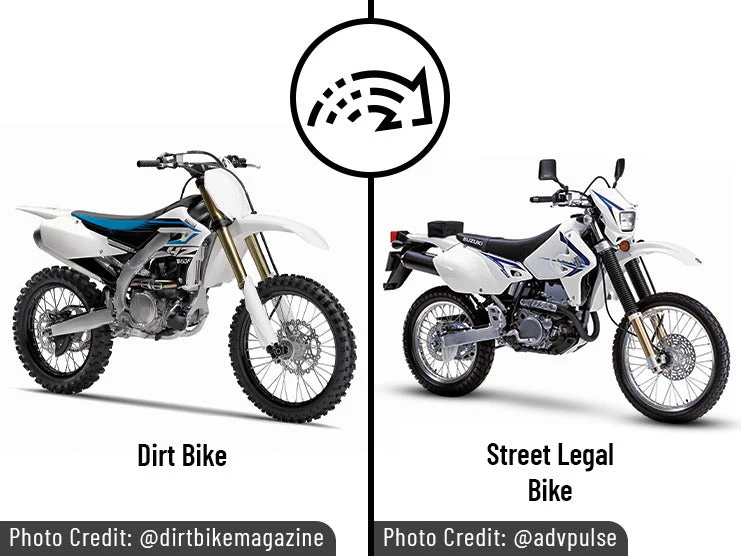DIRT MOTORCYCLES are popular worldwide due to their power output and suspensions. However, as per government regulations and traffic laws, dirt motorcycles are not considered street-legal. This makes it impossible for riders to operate standard dirt motorcycles within cities. However, any dirt motorcycles can be converted into street-legal vehicles by making a few modifications.
Also Read: TOP FIVE DIRT BIKE BRANDS IN 2022
Table of Content
1. What is a Dirt Motorcycle?
Dirt motorcycles have been around since the 1950s. They are slim and lightweight vehicles that are easy to maneuver, and offer high ground clearance, longer suspension wheel travel, and a high seat height. Dirt motorcycles have narrow SEATS, upright and straight HANDLEBARS, high fenders, and slim tires with deep grooves in their tread patterns. They are built to travel off-road, on rough terrain, or over bumpy surfaces. Dirt motorcycles produce high torque but low horsepower, resulting in a lower top speed.
2. What Are the Requirements for a Motorcycle to be Considered Street-Legal?

All street-legal motorcycles must follow EPA emission standards dictated by the government. Every street-legal motorcycle must also have a functional headlight, tail light, side indicators, and side mirrors.
Also Read: 10 BEST ENDURO MOTORCYCLE IN 2022
3. How Can You Make Your Dirt Motorcycle Street-Legal?
3.1 Exhaust & Emission
Most dirt motorcycles have noisy exhausts which emit dark smoke. As per safety regulations the noise from the exhaust should not exceed 45 dB at night and 55 dB during the day in urban residential areas. Unfortunately, most dirt motorcycle exhausts can reach generate a sound around 90 dB or higher Dirt motorcycle exhausts also do not have a catalytic converter. The catalytic converter is required to meet EPA emission standards as it reduces the amount of toxic pollutants emitted from the exhausts. It also does not help that dirt motorcycle exhausts do not have a baffle that can reliably dampen sound.
Changing the exhaust plays a significant role in transforming a dirt motorcycle into a street-legal motorcycle. The new exhaust should have a catalytic converter and a small baffle to reduce noise and pollutants released. After changing the exhaust, the rider should produce less throttle and sound without compromising the motorcycle’s performance.
3.2 Accessories

Most standard dirt motorcycles are slim and lightweight vehicles with little room to fit accessories like the headlight, tail light, side mirrors, and side indicators. Having these lights and signals is mandatory for a street-legal motorcycle since the headlight illuminates the road at night and the tail light makes it easier for other vehicles to spot you. Aside from lights and signals, riders may also attach luggage bags to help them carry their belongings.
3.3 Body
Replacing certain parts of a dirt motorcycle, such as the fuel tank, side panels, fenders, and seat, to be better suited for city travel rather than off-roading will help make it more like a street-legal motorcycle.
3.4 Registration
After you are done refitting your dirt motorcycle to be more like a street-legal motorcycle, you can then register it as an official street-legal motorcycle. Keep in mind that every state has different rules and regulations regarding motor vehicles. Your dirt motorcycle can only be registered as a street-legal motorcycle if it satisfies all the regulations.
4. Conclusion
Dirt motorcycles have smaller exhaust pipes which generate a lot of noise, requiring you to get long exhausts with small baffles and catalytic converters. After changing the exhausts, you should notice a difference in performance. After installing proper accessories like SADDLEBAGS or other luggage bags, the dirt motorcycle should perform like an adventure motorcycle.













Leave a comment
All comments are moderated before being published.
This site is protected by hCaptcha and the hCaptcha Privacy Policy and Terms of Service apply.